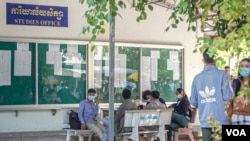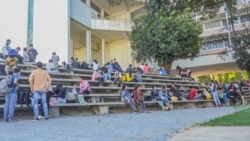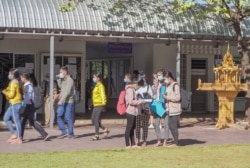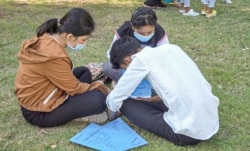Kun Chanty arrived in Phnom Penh in early January. The 19-year-old is from Kampong Thom and recently passed her Grade 12 examination. She is looking forward to enrolling in a bachelor’s degree.
A taxi dropped her and five friends, who were also high school graduates, at a rented home in the city. Chanty said they were all beginning the nerve-racking process of living in a new city, but also focusing on university applications and looking for scholarship opportunities to fund their higher education.
“My brothers and sisters didn’t have the chance to go to college like me because our family is poor,” said Kun Chanty, who is the only one in her family to graduate high school.
The group is a mix of excitement and anxiety. This is their first time in the big city. “I feel so new in the city. I only used to live in the countryside,” Kun Chanty said.
After multiple school closures and postponements to the national examinations, Prime Minister Hun Sen announced last December that all high school students would automatically pass the national examination.
With the announcement, more than 121,000 students across the country reached the next step in their education: applying to universities and for scholarships.
Kun Chanty and her friends are trying to figure out the major they wanted to study at university, which would then impact the scholarships on offer to them. But with the school closures, they had received little information from universities or past graduates, who would normally assist and advise students, especially from more rural provinces.
“This year, I did not receive as much information. When seniors graduated in the past, lots of universities went to provide information directly in their schools,” she told VOA Khmer.
“No one has ever come to tell us about majors or skills we need to learn, so it is very challenging,” she added.
Education Ministry Spokesperson Ros Soveacha said the ministry had printed booklets providing scholarship information and courses available at universities, which, he said, should be enough for them to make a decision.
Heng Vanda, president of the Cambodian Higher Education Association, said on average around 60 to 70 percent of students enroll in a university. He speculates that the number could increase this year.
“Normally some of them, after finishing high school, would go to work abroad like in Thailand or Korea,” he said. “But, with COVID-19 restrictions preventing them from traveling this year, they are likely to enroll in colleges instead,” he said.
He said the government had done a good job to provide adequate information to students, urging university applicants to use social media sources to research additional information from university Facebook pages.
Khan Sophorn took the decision to study architecture at the Institute of Technology Cambodia. She moved from Takeo province to live with her sister, who works at a garment factory in Phnom Penh.
The 18-year-old loves drawing and sketching, which are good prerequisites for an architecture degree, but is still nervous about making this decision.
“This transition is important because this will determine our goal. If we make the wrong choice, it will be hard to reach the destination,” she said.
Pa Chanroeun, a social development researcher, said it was not uncommon for students to question their choices for higher studies because the Cambodian education system does not equip them to realize their likes and dislikes.
“I’d say around 80 or 85 percent of high schoolers in Cambodia have no clue what major they should study or what they should do next,” Pa Chanroeun said.
He said students should be given as much information and guidance to assist them in making this decision, and even though things were a little chaotic because of the COVID-19 pandemic, university aspirants should reach to alumni networks, adding that he often gets requests from recent high schoolers.
When it comes down to it, most students are basing their decisions based on the availability of scholarships and affordability of courses.
Kun Chanty said she was keeping her options open. If she receives a scholarship she would definitely major in Mathematics. If she doesn’t clear the scholarship application process, she would have to pick a Chemistry major, which is more affordable for her.
Khan Sophorn is grappling with these same uncertainties. She is facing the prospect of likely deferring her education for a few years to save and pay the tuition fee.
“If I could not obtain any scholarship, I will need to work and study at the same time to earn money,” she said.
“Or maybe I will take a gap year or two to work and save money to cover my college expenses.”







